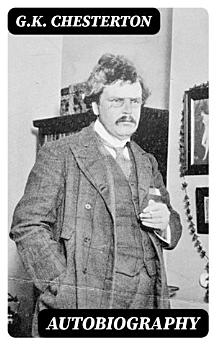Autobiography
ସେପ୍ଟେମ୍ବର 2022 · DigiCat
ଇବୁକ୍
283
ପୃଷ୍ଠାଗୁଡ଼ିକ
family_home
ଯୋଗ୍ୟ
info
reportରେଟିଂ ଓ ସମୀକ୍ଷାଗୁଡ଼ିକୁ ଯାଞ୍ଚ କରାଯାଇନାହିଁ ଅଧିକ ଜାଣନ୍ତୁ
ଏହି ଇବୁକ୍ ବିଷୟରେ
G.K. Chesterton's "Autobiography" offers an intimate glimpse into the life and thoughts of one of the early 20th century's most prolific writers. Written in a conversational and often humorous tone, the text reflects Chesterton's keen observations on philosophy, religion, and the human experience. He seamlessly blends personal anecdotes with profound insights, creating a narrative that is both engaging and intellectually stimulating. This work exists within the larger context of Chesterton's contribution to literary and social discourse, as he skillfully merges autobiographical elements with commentary on the state of modernity and the travails of contemporary life. Chesterton, a towering figure in literature and theology, was influenced by his upbringing in a Victorian household as well as his experiences as a journalist and social critic. His exploration of faith and philosophy, sparked by the dualities of life and the paradoxical nature of existence, deeply informs this autobiography. It is as much a reflection on the cultural landscape of his time as it is a personal memoir, offering insights into his journey toward becoming a Christian apologist and literary giant. I highly recommend "Autobiography" to readers who seek not only to understand Chesterton's life but also to grasp the complexities of the early 20th-century intellectual climate. This engaging work is a treasure for anyone interested in how personal experiences shape broader philosophical ideas and a reminder of the vibrant interplay between art and life.
ଲେଖକଙ୍କ ବିଷୟରେ
Gilbert Keith Chesterton (1874-1936) was a prolific English writer, poet, philosopher, dramatist, journalist, orator, lay theologian, biographer, and literary and art critic. Known for his distinctive style, which combined wit, paradox, and a joyful sense of the absurd, Chesterton remains one of the most quoted authors of the 20th century. His Autobiography, published posthumously in 1936, provides not just a glimpse into the author's own life, but also serves as a window to the cultural and intellectual climate of his era. Chesterton is perhaps best remembered for his creation of the priest-detective Father Brown, featured in several short story collections including 'The Innocence of Father Brown' and 'The Wisdom of Father Brown.' His other notable works include 'Orthodoxy,' a personal account of his spiritual journey and the Christian philosophy he espoused, and 'The Man Who Was Thursday,' a metaphysical thriller. Chesterton's writing was marked by a robust approach to the Christian faith, sharp criticism of materialism and modern progress, and a democratic admiration for the common man. His influence is seen in the works of authors such as C.S. Lewis, Jorge Luis Borges, and Neil Gaiman. Chesterton's profound influence on both the literary and theological landscapes continues to be felt to this day.
ଏହି ଇବୁକ୍କୁ ମୂଲ୍ୟାଙ୍କନ କରନ୍ତୁ
ଆପଣ କଣ ଭାବୁଛନ୍ତି ତାହା ଆମକୁ ଜଣାନ୍ତୁ।
ପଢ଼ିବା ପାଇଁ ତଥ୍ୟ
ସ୍ମାର୍ଟଫୋନ ଓ ଟାବଲେଟ
Google Play Books ଆପ୍କୁ, Android ଓ iPad/iPhone ପାଇଁ ଇନଷ୍ଟଲ୍ କରନ୍ତୁ। ଏହା ସ୍ଵଚାଳିତ ଭାବେ ଆପଣଙ୍କ ଆକାଉଣ୍ଟରେ ସିଙ୍କ ହୋଇଯିବ ଏବଂ ଆପଣ ଯେଉଁଠି ଥାଆନ୍ତୁ ନା କାହିଁକି ଆନଲାଇନ୍ କିମ୍ବା ଅଫଲାଇନ୍ରେ ପଢ଼ିବା ପାଇଁ ଅନୁମତି ଦେବ।
ଲାପଟପ ଓ କମ୍ପ୍ୟୁଟର
ନିଜର କମ୍ପ୍ୟୁଟର୍ରେ ଥିବା ୱେବ୍ ବ୍ରାଉଜର୍କୁ ବ୍ୟବହାର କରି Google Playରୁ କିଣିଥିବା ଅଡିଓବୁକ୍କୁ ଆପଣ ଶୁଣିପାରିବେ।
ଇ-ରିଡର୍ ଓ ଅନ୍ୟ ଡିଭାଇସ୍ଗୁଡ଼ିକ
Kobo eReaders ପରି e-ink ଡିଭାଇସଗୁଡ଼ିକରେ ପଢ଼ିବା ପାଇଁ, ଆପଣଙ୍କୁ ଏକ ଫାଇଲ ଡାଉନଲୋଡ କରି ଏହାକୁ ଆପଣଙ୍କ ଡିଭାଇସକୁ ଟ୍ରାନ୍ସଫର କରିବାକୁ ହେବ। ସମର୍ଥିତ eReadersକୁ ଫାଇଲଗୁଡ଼ିକ ଟ୍ରାନ୍ସଫର କରିବା ପାଇଁ ସହାୟତା କେନ୍ଦ୍ରରେ ଥିବା ସବିଶେଷ ନିର୍ଦ୍ଦେଶାବଳୀକୁ ଅନୁସରଣ କରନ୍ତୁ।








